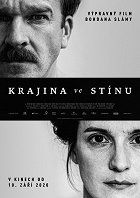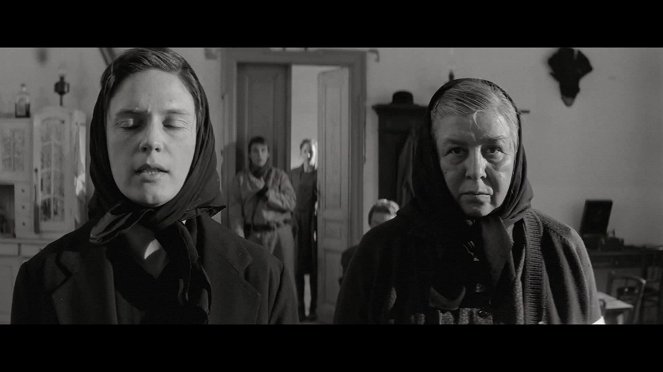Director:
Bohdan SlámaGuión:
Ivan ArsenjevCámara:
Diviš MarekMúsica:
Jakub KudláčReparto:
Magdaléna Borová, Stanislav Majer, Csongor Kassai, Barbora Poláková, Pavel Nový, Petra Špalková, Zuzana Kronerová, Agi Gubíková, Robert Mikluš (más)Sinopsis(1)
What makes people start killing their own neighbours? Who is responsible for something like that? A black and white fresco about the fatal transformation of a small village on the Czech-Austrian border from the late 1930s to the early 1950s is inspired by real events. (Summer Film School)
Reseñas (6)
This is one of the great black-and-white widescreen films about great things that is exactly what it should theoretically be. The question is whether these crystalline obligatory films really need to be made. Nobody will even bother with the fact that the soundtrack features randomly chosen German hits that are completely wrongly chosen because apparently, it was enough for Sláma that the lyrics are in German, and German is the definition of evil.
()
Regardless of how the character portrayal of the Czechs and Germans may bother many people, I liked Shadow Country, mainly thanks to its black and white visuals, the raw (and by Czech standards solid) performances of the actors and the story itself, which in one village during the 1930s to 1950s illustrated the conditions that prevailed at that time. Regardless of whether the plot was more or less true or scripted, there were definitely some scenes that didn't leave me cold, even though it is quite a lightweight concoction in terms of rawness compared to last year's The Painted Bird. It's hard to judge people you don’t know and times you have not experienced, and although Bohdan Sláma's film casts shadows of blame more on the Czech population, on the other hand we can't lump all Germans into one (Nazi) bag. Similarly, it is difficult to judge the pro-German population, did they do it for money, property, status, or just to survive and not get sent to a camp? In this respect, I'm a fairly ahistorical and tolerant viewer, and perhaps that's why I don't feel so irritated by Shadow Country.
()
La mejor película de Bohdan Sláma, que a muchos no les gustará. A aquellos que están impregnados de ideales ingenuos sobre los héroes checos, a aquellos que no les gusta admitir traición, cobardía y colaboración bajo cualquier régimen y con cualquier persona, y a aquellos a quienes esta película les saca los esqueletos del armario. No pertenezco a ningún grupo y estoy emocionado de que Bohdan Sláma haya filmado una película así. No se puede vincular específicamente a una región geográfica, a una parte de la región, a un pueblo y a un evento histórico específico. Hay que verlo desde la perspectiva de toda la República Checa, o más bien de Checoslovaquia y de una serie de eventos históricos del convulso siglo XX. Aprecio especialmente la comparación de dos bloques de tiempo que tuvieron consecuencias diametralmente opuestas. Desde mi punto de vista, los actores destacados fueron Csongor Kassai, Magdaléna Borová, Barbora Poláková y Jiří Černý. Además, la excelente cinematografía en blanco y negro le añadió la crudeza y autenticidad adecuadas. Aún no he visto "Šarlatán", pero para mí esta será probablemente la película checa del año 2020.
()
I have quite an issue with this film. It’s not because of the subject matter. I try not to view history as black and white, so I don't think that every German is a Nazi, or that every Czech is a brave resistance hero. The Czechoslovak Revolutionary Guards are on the level of the Dirlewanger Brigade as far as I’m concerned, so the film didn’t cause any damage to my national pride. What bothered me, however, was that there wasn't enough character development, and the plot didn’t sufficiently convey the events. Despite it being over two hours, the running time wasn’t enough. The main message: war is atrocious, and it breeds even more atrocity. I agree, but I’m giving it only three stars.
()
Hard times awaken the basest desires and instincts in most people, so that they start treating each other worse than animals, without the slightest hint of humanity. And it’s about just such an unfortunate period in Czech history that Bohdan Sláma (who, in my opinion, is one of the best Czech directors of our time) recounts in his movie Shadow Country. This is not only about the past and the region of Vitoraz, where the story takes place, but it can also be applied to our whole country, not to mention the fact that this glimpse into dismal history also has a very cautionary overlap with today. Evil is ever present among us and any social problem or hint of crisis feeds it greatly... The structure of the story could probably be faulted in a few ways, but otherwise it is clearly a work of good craftsmanship in almost every respect. Apart from the music, the period atmosphere is also emphasized by the refined black and white visuals. Another significant positive side are the precise acting performances of all the actors. (85%)
()
An extremely chilling movie. I couldn’t get a word out of my mouth for a good while after this ended. The historical events that were unavoidable are depicted in a raw, realistic and shocking way. People paralyzed with fear, hate and depravity. The acting was excellent; I must mention in particular marvelous performances from M. Borová, P. Špalková, Z. Kronerová and M. Ludvíková. All of these actresses were convincing and a hundred percent involved. The camerawork, the music and it being shot in black and white underpin the atmosphere. OK, so the movie lacks any climax, but you can’t expect any climax from those awful times.
()

